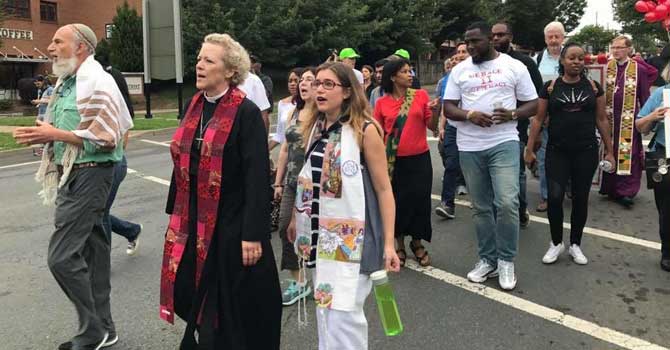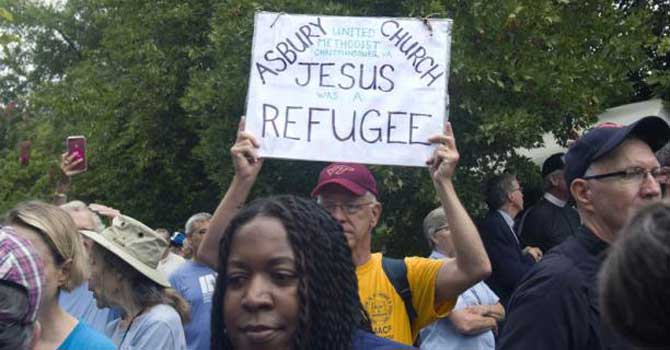As tiki torch-bearing terrorists marched on the grounds of the University of Virginia on Friday, Aug. 11, hundreds of people were gathered in my church not 100 yards away, girding ourselves for what lay ahead the next day.
We prayed and sang and listened to the soaring words of Cornel West and Traci Blackmon. Christians and Jews and Muslims offered Scripture and song and prayer.
With candles lit along the center aisle, we sang “This Little Light of Mine” and freedom songs. Folks banged on the pews and stomped their feet (something you don’t often see in our Episcopal church).
The singing continued as the violence outside increased, threatening to spill over to our side of the street. We kept on singing and reassuring people until we were able to shepherd folks out a back door in the safety of groups.
Anxiety was high, so it’s a good thing that being a pastoral, calming presence is my job. But there were moments when I regretted not bringing that overnight bag I had thought about packing at home that morning.
I’ve been in Charlottesville, Virginia, for less than three years. But I have a deep connection with this place.
My grief and anger over the events of recent days spring from a deep love of this city that has welcomed me and privileged me with the responsibility of being a priestly and pastoral presence here.
I’m proud of the way disparate groups in Charlottesville joined together to confront this threat.
I am a member of the Charlottesville Clergy Collective, an organization founded by the Rev. Dr. Alvin Edwards, the pastor of Mt. Zion First African Baptist Church in Charlottesville, after the mass shooting in Charleston.
But there were other groups here as well, and activists from across the spectrum surrounded, protected and assisted when law enforcement was either absent or stretched too thin to help. We may not agree on tactics or message or language or much else, but in the heat of the moment, our common bond to fight domestic terrorism on our streets trumped everything else.
I have found friends among people whom I would otherwise have had no reason to know. It’s one of the many gifts of these hard days.
The morning after the gathering at my church, I rose before dawn and headed to the oldest African-American church in Charlottesville. Inside, people swayed to the sound of the praise band playing anthems from the civil rights movement. Cornel West urged us on to confront the neo-Nazis who had invaded our town.
We blessed those who planned to confront the demonstrators. Then we went into the street ourselves, leading a parade of clergy and community members in a several-blocks-long procession.
I spent most of my day at the First United Methodist Church, adjacent to Emancipation Park. I settled in for a long day of prayer, singing, offering respite and refuge, and most of all, declaring that evil will be confronted with the might of the people of God. Volunteers handed out water and snacks and provided cellphone chargers and quiet space for conversation or medical attention.
Like everyone else, I worried about the people holding space on the other side of the park, standing arm in arm, facing those who would just as soon mow them down as look at them. I wandered back and forth from the front steps overlooking the Robert E. Lee statue -- catching whiffs of pepper spray, witnessing the gut-churning sight of police snipers posted on the roof of the local funeral home -- to the back parking lot, where people entering the church passed through an ad hoc security station to prevent anyone from bringing weapons into this place of sanctuary.
But we didn’t kid ourselves that we were immune from violence. A gathering of counterprotesters in the back corner of the parking lot was assaulted by a roving band of black-helmeted white supremacists. They beat and knocked some of the counterprotesters to the ground before departing to wreak their violence somewhere else.
Throughout the day, we welcomed traumatized defenders of our streets who had come up against violence and hate. Word came in about the car attack a few blocks away, and soon people who had seen the crash made their way to us, dazed and in shock, to find a quiet place to rest, to sit, to receive care.
I wandered from person to person among Black Lives Matter activists, gender minorities, anti-fascists and others, some holding tightly to each other and weeping in the pews. There were no words to speak other than quiet blessing as I moved among them with an aching heart.
A local rabbi stayed at the church, looking out over the park, strumming her guitar and leading the singing. Her senior rabbi was also there, and I was struck by the fierce courage of these Jews, standing there clad in tallit and kippah, looking out over Emancipation Park at the gathering of neo-Nazis who have threatened a new Holocaust.
Early in the afternoon, they received news that someone had threatened their synagogue, vowing to “set fire to the Jews.” They’d already moved their sacred scrolls to a safe place but now were helpless to do anything other than watch and pray.
I did a lot of talking on Saturday and in the days following, and my message has been concise and consistent: the power behind us is far greater than the evil that confronts us. If we unite across our differences with a common goal before us, we can uproot and disarm ideologies of hate.
Yet we must not stop at reactive gatherings to confront protests brought to our streets and our neighborhoods. We cannot let exhaustion or fear or the magnitude of the work keep us from the deeper work of justice -- exposing the racist structures that allow white supremacy to flourish, and standing up for moral legislation, voting rights, economic opportunity, affordable housing and basic rights that are foundational to human flourishing.
This is the hope that I witnessed in action on the streets of Charlottesville that weekend, and it is the hope that I will carry in my heart in the days and weeks ahead as we continue the work of creating a better world for all of God’s people.

















